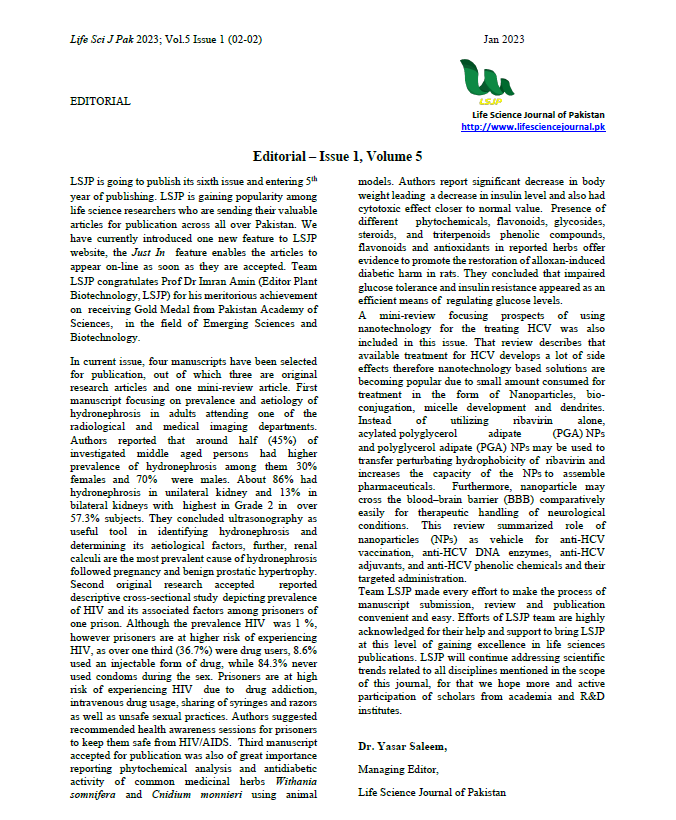Editorial
Main Article Content
Abstract
LSJP is going to publish its sixth issue and entering 5th year of publishing. LSJP is gaining popularity among life science researchers who are sending their valuable articles for publication across all over Pakistan. We have currently introduced one new feature to LSJP website, the Just In feature enables the articles to appear on-line as soon as they are accepted. Team LSJP congratulates Prof Dr Imran Amin (Editor Plant Biotechnology, LSJP) for his meritorious achievement on receiving Gold Medal from Pakistan Academy of Sciences, in the field of Emerging Sciences and Biotechnology.
In current issue, four manuscripts have been selected for publication, out of which three are original research articles and one mini-review article. First manuscript focusing on prevalence and aetiology of hydronephrosis in adults attending one of the radiological and medical imaging departments. Authors reported that around half (45%) of investigated middle aged persons had higher prevalence of hydronephrosis among them 30% females and 70% were males. About 86% had hydronephrosis in unilateral kidney and 13% in bilateral kidneys with highest in Grade 2 in over 57.3% subjects. They concluded ultrasonography as useful tool in identifying hydronephrosis and determining its aetiological factors, further, renal calculi are the most prevalent cause of hydronephrosis followed pregnancy and benign prostatic hypertrophy. Second original research accepted reported descriptive cross-sectional study depicting prevalence of HIV and its associated factors among prisoners of one prison. Although the prevalence HIV was 1 %, however prisoners are at higher risk of experiencing HIV, as over one third (36.7%) were drug users, 8.6% used an injectable form of drug, while 84.3% never used condoms during the sex. Prisoners are at high risk of experiencing HIV due to drug addiction, intravenous drug usage, sharing of syringes and razors as well as unsafe sexual practices. Authors suggested recommended health awareness sessions for prisoners to keep them safe from HIV/AIDS. Third manuscript accepted for publication was also of great importance reporting phytochemical analysis and antidiabetic activity of common medicinal herbs Withania somnifera and Cnidium monnieri using animal models. Authors report significant decrease in body weight leading a decrease in insulin level and also had cytotoxic effect closer to normal value. Presence of different phytochemicals, flavonoids, glycosides, steroids, and triterpenoids phenolic compounds, flavonoids and antioxidants in reported herbs offer evidence to promote the restoration of alloxan-induced diabetic harm in rats. They concluded that impaired glucose tolerance and insulin resistance appeared as an efficient means of regulating glucose levels.
A mini-review focusing prospects of using nanotechnology for the treating HCV was also included in this issue. That review describes that available treatment for HCV develops a lot of side effects therefore nanotechnology based solutions are becoming popular due to small amount consumed for treatment in the form of Nanoparticles, bio-conjugation, micelle development and dendrites. Instead of utilizing ribavirin alone, acylated polyglycerol adipate (PGA) NPs and polyglycerol adipate (PGA) NPs may be used to transfer perturbating hydrophobicity of ribavirin and increases the capacity of the NPs to assemble pharmaceuticals. Furthermore, nanoparticle may cross the blood–brain barrier (BBB) comparatively easily for therapeutic handling of neurological conditions. This review summarized role of nanoparticles (NPs) as vehicle for anti-HCV vaccination, anti-HCV DNA enzymes, anti-HCV adjuvants, and anti-HCV phenolic chemicals and their targeted administration.
Team LSJP made every effort to make the process of manuscript submission, review and publication convenient and easy. Efforts of LSJP team are highly acknowledged for their help and support to bring LSJP at this level of gaining excellence in life sciences publications. LSJP will continue addressing scientific trends related to all disciplines mentioned in the scope of this journal, for that we hope more and active participation of scholars from academia and R&D institutes.
Dr. Yasar Saleem,
Managing Editor,
Life Science Journal of Pakistan
Article Details

This work is licensed under a Creative Commons Attribution 4.0 International License.

